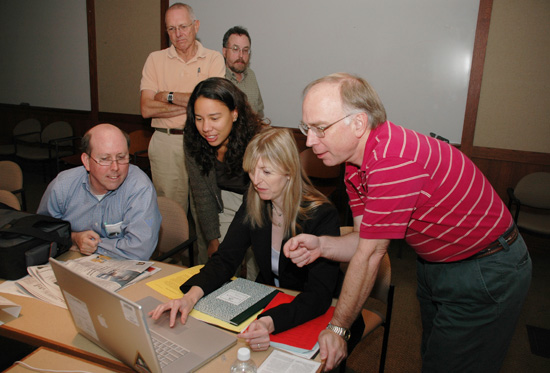Planetary Group Discusses NASA, Spaced-Based Achievements
 |
| Members of the Committee on Planetary and Lunar Exploration (COMPLEX) met at Woodhead Lounge July 20-22. Martha Gilmore, assistant professor of earth and environmental sciences, (pictured second from left in the first row) coordinated the meeting. |
| Posted 08/17/05 |
| Martian oceans, solar system exploration and telescopic studies of Neptune were all topics of discussion during a planetary committee meeting at Wesleyan.The Committee on Planetary and Lunar Exploration (COMPLEX) met at Wesleyans Woodhead Lounge July 20-22. COMPLEX advises the National Academies Space Studies Board on the entire range of planetary system studies that can be conducted from space as well as on ground-based activities in support of space-based efforts.
The 10-member committee assists the board in carrying out studies, monitoring the implementation of strategies, and providing evaluations of programs and strategic priorities for NASA and other government agencies. Martha Gilmore, assistant professor of earth and environmental sciences and COMPLEX member, coordinated the Wesleyan meeting. The committee meets about three times a year in various locations. Some of the work we performed in this meeting is to consider some of the consequences of the change to a new NASA administrator and the president’s Vision for Space Exploration on solar system exploration priorities as they were defined by the community prior to these changes, Gilmore says. It is anticipated that the group will formulate and participate in studies to address this issue. Andrew Dantzler and Douglas McCuistion of NASA Headquarters provided a Mars Exploration Program status report and the status of NASA solar system exploration activities. In addition, Gilmore spoke about the geology and rocks from the opening of the Atlantic Ocean; James Greenwood, research assistant professor and visiting assistant professor of earth and environmental sciences, spoke about geochemistry of a martian ocean; and William Herbst, the John Monroe Van Vleck Professor of Astronomy, chair of the Astronomy Department and director of the Van Vleck Observatory, discussed the circumstellar disk of KH15D. Members of the board included representatives from NASAs Jet Propulsion Laboratory, University of Michigan, University of Texas, University of Arizona, University of Hawaii, University of California, Los Angeles and Johns Hopkins University. For more information on the committee or their projects, visit: http://www7.nationalacademies.org/ssb/complex1.html or http://www.nasa.gov/missions/solarsystem/explore_main.html. |
| By Olivia Drake, The Wesleyan Connection editor |

